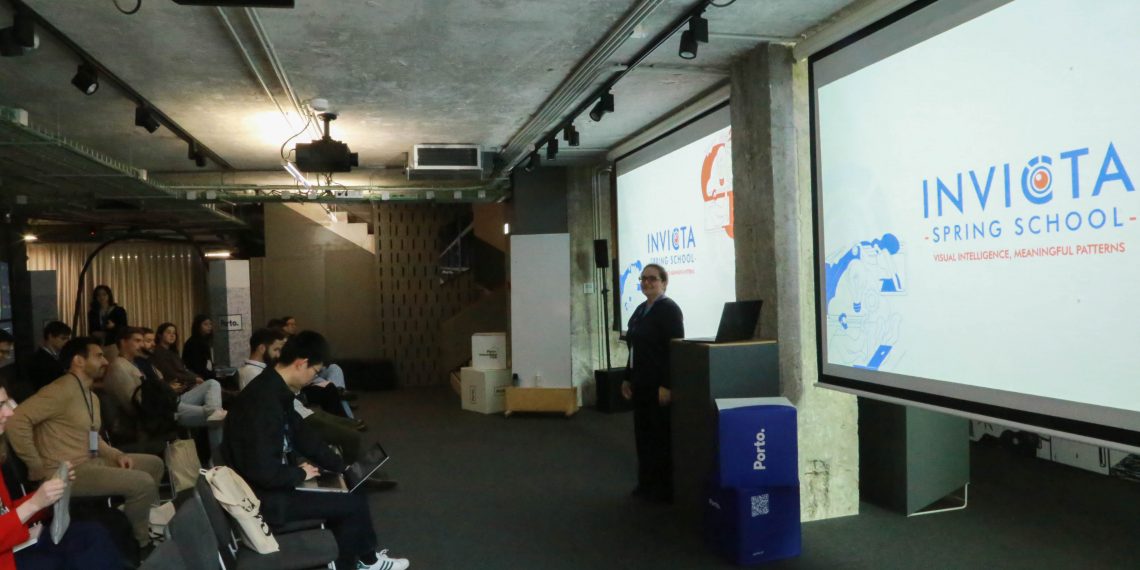Artificial Intelligence (AI) is very much in the spotlight; and the truth is that collaboration with humans is increasingly becoming a reality. In this sense, INESC TEC organised the Spring School INvicta School of VIsion, Computational Intelligence, and PatTern Analysis (INVICTA), providing an opportunity for academia and industry representatives to familiarise themselves with real-world use cases of AI, computer vision, and pattern recognition – while staying updated on the state of the art in these fields.
A heir of the work promoted over 10 years by the Vision Understanding and Machine Intelligence Summer School (VISUM), also organised by the Visual Computing and Machine Intelligence (VCMI) research group (part of the Centre for Telecommunications and Multimedia – CTM), the second edition of the event took place between April 7 and 11. The Porto Innovation Hub welcomed INVICTA2025 and 25 national and international participants, including master’s, PhD, and post-doc students, researchers, and professionals in the fields of computer science and AI.

According to the head of the INVICTA organising committee, Ana F. Sequeira, “organising events like INVICTA is a way for INESC TEC (and partners) to position itself as a transformative and cutting-edge institution in a knowledge area that is continuously expanding and evolving at a staggering pace. By creating initiatives that promote knowledge-sharing, we are contributing to a more conscious community, one that is better prepared to deal with the challenges posed by these powerful technologies and tools – which have, and will continue to have, a significant impact on our lives.”
With the theme “Visual Intelligence, Meaningful Patterns”, INVICTA provided a week of immersive and comprehensive educational experiences, bringing together an international community connected to the topics discussed. Beyond the theoretical relevance of the main sessions and workshops, attendees had the opportunity to apply what they had learned and gain insights into the development of intelligent systems, combining research and innovation. Throughout the week, the Porto Innovation Hub also hosted several talks on AI, with speakers from both academia and industry discussing topics like AI applications in healthcare, energy efficiency, and the design of more reliable language models. In addition to the presentations, there was room for showcasing successful case studies of the use of said tools, not only to improve knowledge but also to provide a broader perspective on real-world applications.

In addition to the main topics of the sessions, the programme included the AI Talks, a series of collaborative lectures that addressed topics in a more informal manner, engaging directly with the audience. These talks focused on cancer research, improving health information systems, languages for communicating with AI, and building safer AI systems, among other subjects.
The event also featured the traditional Round Table, promoting a debate among various experts in the field, moderated by an external person. This year’s round table was dedicated to Responsible AI, and included experts in intelligent systems, computer graphics, and healthcare research. To foster social interaction among participants, this edition included a vibrant social programme, with a Porto de Honra (welcoming reception) on the first day, a visit to the Museu Casa do Infante on the second day, a Social Dinner on the third day, and a Games Night on the fourth day. All activities were designed to foster a community of AI enthusiasts and those interested in different applications.

Reflecting on the event, Ana F. Sequeira shared that “the active participation of representatives from the national and international AI ecosystems at INVICTA, and their interaction with experts in a nearly informal and close-knit manner, confirms our desire to continue developing initiatives that promote the dissemination of technical knowledge, while guiding people to think critically about these topics. This will contribute to an informed community, aware of the impact AI can have on civil society and humanity. After two truly successful editions, we are already thinking about the next challenges – just keep a close look on our work, to find out what’s next.”
At the end of five days of continuous activities and intense learning, it was time to reflect on the social moments of camaraderie, and the relationships established, which motivated the organisers to prepare the upcoming editions.
The INESC TEC researcher mentioned in this news piece is associated with INESC TEC.


 News, current topics, curiosities and so much more about INESC TEC and its community!
News, current topics, curiosities and so much more about INESC TEC and its community!